RAISING QUAIL FOR EGGS
One of the greatest benefits to raising quail is the supply of fresh, delicious, and nutritious eggs that they provide. In this article you’ll find all the info you need to know about raising quail for eggs.
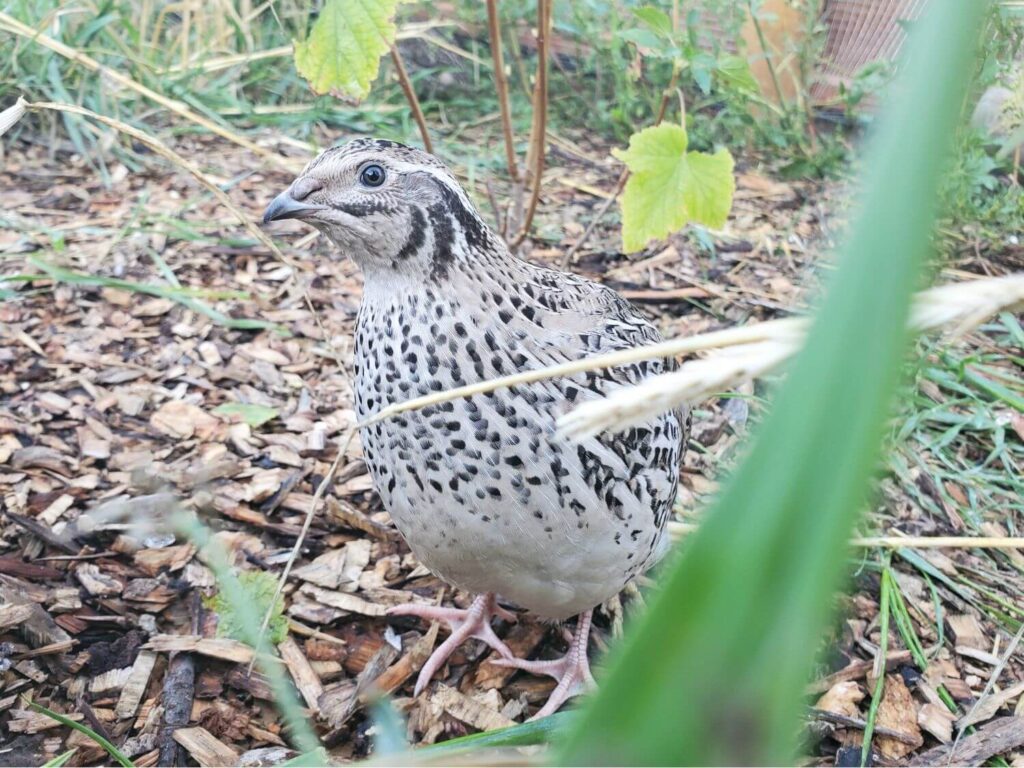
Check out my complete guide to raising quail here: Everything You Need to Know About Raising Quail
This post may include affiliate links. As an Amazon Associate I earn from qualifying purchases. Find more info in my privacy policy.
RAISING QUAIL FOR EGGS: THE BASICS
QUAIL EGG PRODUCTION
Quail will typically start to lay eggs around 6-10 weeks of age. On average a quail will lay about one egg per day at peak production. Egg production will begin to slow down around the age of 2-3 years.
Quail require about 14 hours of daylight in order to lay eggs. Their egg production can be extended by providing a light source during times of the year with shorter daylight hours. Keep in mind that forcing egg production and not allowing rest periods can shorten the lifespan of the hens.
Male quail are not required for hens to produce eggs. Males are only necessary if you would like fertilized eggs. Keeping the ratio to 1 male for every 4-5 females will ensure a good fertilization rate, if this is your goal.
WHAT TO FEED QUAIL FOR EGG PRODUCTION
Quail require a higher protein diet. Aim for a feed with 25-30% protein to ensure they have the proper nutrition to support egg production.
In addition to their feed, you’ll need to supplement grit and a source of calcium, such as oyster shells, so they can properly digest their food and produce shells.
Quail that have access to an outdoor pen will supplement their feed by foraging for any insects, grains, seeds, and nuts that might be available to them. You can also provide extra treats in the form of things such as mealworms, fresh greens, and grains.
IDEAL QUAIL ENVIRONMENT FOR EGG PRODUCTION
Stress can negatively affect egg production in quail. To support production, ensure your quail have:
Adequate housing that provides protection from predators, harsh weather, and somewhere they can hide and feel safe. An absolute minimum of 1 square foot per bird is required, though I would recommend aiming for about 3 square feet per bird.
Access to elements that allow them to perform their natural behaviours such as dust baths, rocks and/or branches to hide behind, and ground to forage.
A proper female to male ratio. If you have males, you should have only 1 male for every 4-6 females to prevent over-breeding and stress on the hens.
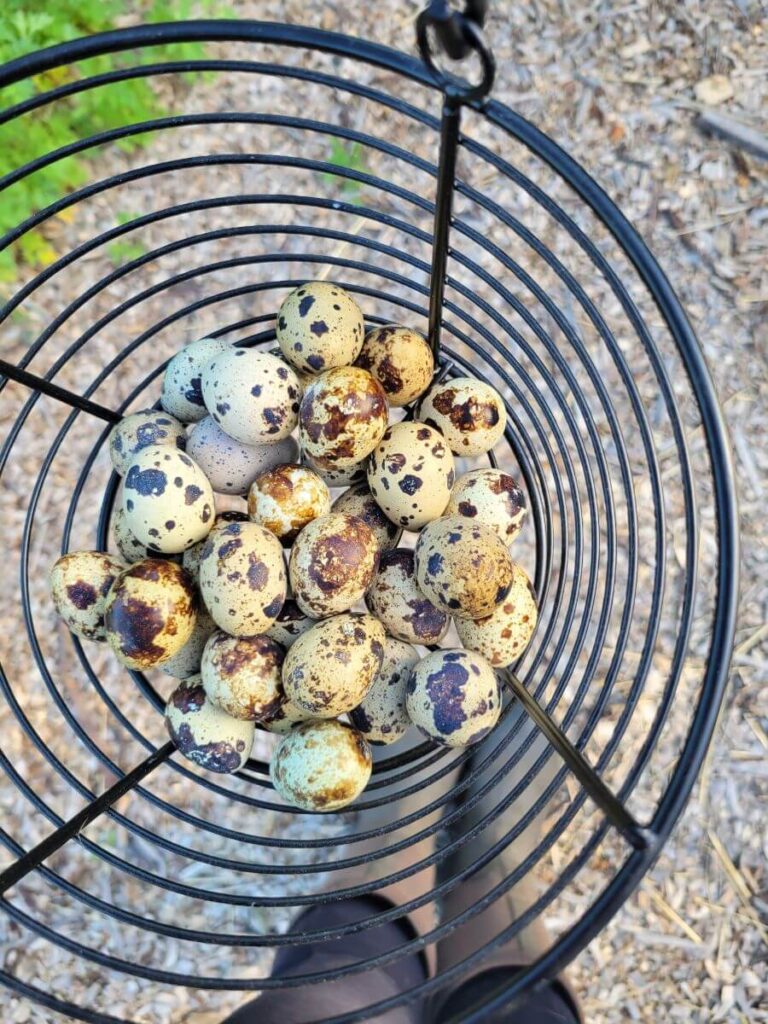
COLLECTING QUAIL EGGS
Quail are ground-dwelling birds and will tend to lay their eggs anywhere and everywhere. You can provide nesting boxes, however, they may not use them. Egg collection can be a bit of a daily easter egg hunt because of this.
I find that they pick favourite spots that they lay in consistently but will occasionally change up their preferred laying area or sometimes lay entirely randomly. I actually quite enjoy the daily egg hunt as it allows me to spend time with the birds and give their coop and aviary a thorough once-over every day.
An egg collection basket or small garden trug work well for collecting quail eggs. Whatever you use, just make sure it doesn’t have openings large enough for the eggs to fall through.
QUAIL EGG STORAGE
Once you’ve collected your quail eggs, you may be wondering how to store them and how long they will stay good for.
Quail eggs have a protective bloom on the shell that should be left intact for storage. This means you should not wash your quail eggs. They may have some dirt (or even poop) on them which can be gently brushed off but do not wash or scrub them.
Unwashed quail eggs can typically be stored at room temperature for up to 4 weeks or refrigerated for up to 6 weeks.
If you feel that you absolutely need to wash your eggs after collecting them, they must be stored in the refrigerator and will not last as long as unwashed eggs.
If you are storing your quail eggs on your kitchen counter, keep in mind that fertilized eggs may start to develop at temperatures above 21C/70F.
I recommend cracking any older eggs into a separate bowl before using to check for signs that they have gone bad or started to develop before adding to your dish.
FLOAT TEST FOR QUAIL EGGS
If you have quail eggs that you’re unsure about, the float test can be an easy way to determine freshness.
As with all eggs, quail eggs have an air pocket inside them that will increase in size as the egg ages and loses moisture through its shell. As the air inside the shell increases, so will its buoyancy.
To preform the float test, simply place the egg(s) into a bowl of water deep enough for them to sink completely.
- If the egg sinks to the bottom and lays on its side, it is fresh.
- If it sinks and stands upright, it is still good to use but is not as fresh as one that lays on its side.
- If the egg floats, it is older and may not be good to use.
The float test simply tells you how much air is inside the egg and not necessarily if the egg has gone bad or not. If you still want to check, you can crack the eggs that float and inspect them. Any eggs that are watery or smell unpleasant should not be consumed.
We choose not to consume eggs that don’t pass the float test and instead add those to our compost pile.
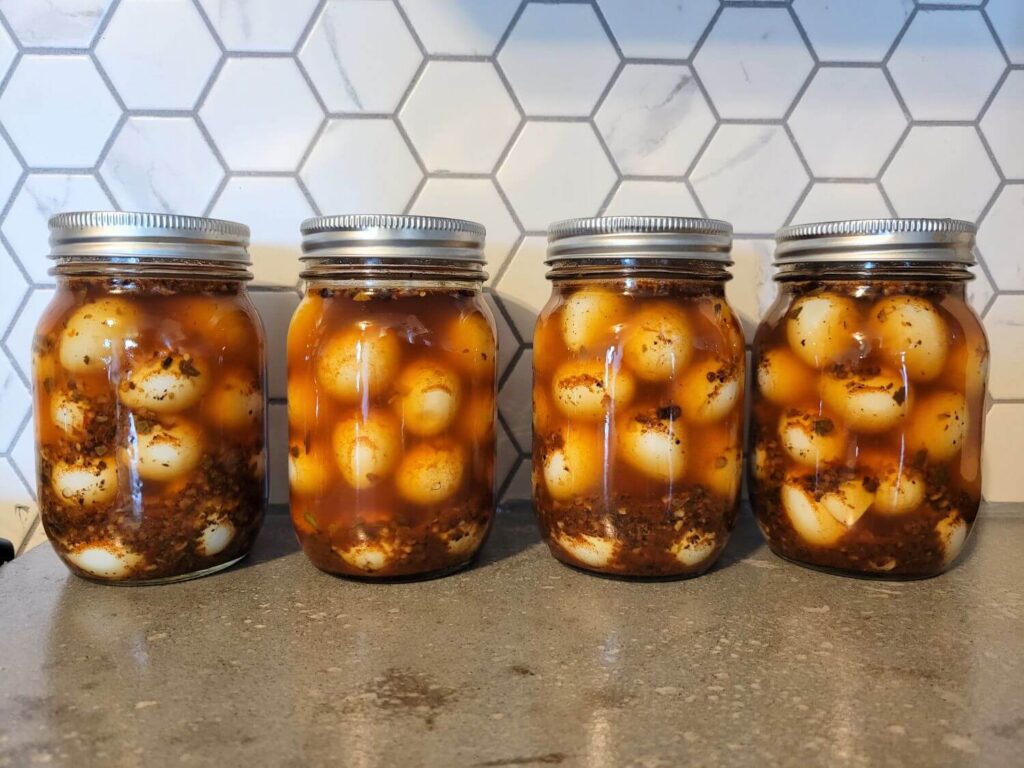
HOW TO USE QUAIL EGGS
Quail eggs are extremely versatile and can be used in many ways. Once you’re ready to use your quail eggs, simply wash them and use them any way you would use a chicken egg.
You’ll need about 3-5 quail eggs to equal 1 chicken egg, depending on size.
QUAIL EGG SCISSORS
Anyone who has attempted to crack a quail egg like you would a chicken egg will tell you that they require slightly different handling.
Quail eggs have a thicker inner membrane than chicken eggs do. Because of this, cracking a quail egg like you would a chicken egg often results in a smushed, goopy mess.
The best way to open a quail egg is with quail egg scissors. This handy tool will allow you to quickly and cleanly open quail eggs. Simply use the scissor to open the wide end of the egg and then dump the contents out through the opening.
Alternatively, you can use a serrated knife to cut open the wide end of the egg. I find that a knife works fine but takes longer and is a little messier than the scissors. If you plan to use quail eggs on the regular, I’d highly recommend you get yourself a pair of quail egg scissors.
HOW TO COOK QUAIL EGGS
You’ll often see quail eggs used in high-end gourmet dishes at fancy restaurants, but cooking quail eggs certainly does not need to be complicated.
Quail eggs, like any other eggs, can be boiled, fried, baked, poached, or scrambled. They can be used in baking, sauces, desserts, quiche, frittatas, and omelettes. They can be deviled, pickled, and used for egg salad. The possibilities are endless.
Here are a few tips for cooking quail eggs, from my personal experience:
Because of their small size, quail eggs require slightly less time to cook than chicken eggs. Keep a close eye on them while frying. Soft boiled quail eggs take about 2 minutes, while medium require 3 minutes and hard boiled require about 4 minutes. Poached, they take about 1 minute.
Quail eggs are great for sunny side up eggs. The higher yolk-to-white ratio means they cook much more consistently and don’t leave that runny white like you often get with chicken eggs.
The higher yolk-to-white ratio makes quail eggs great for baking and will provide a slightly creamier and richer egg in your recipes.
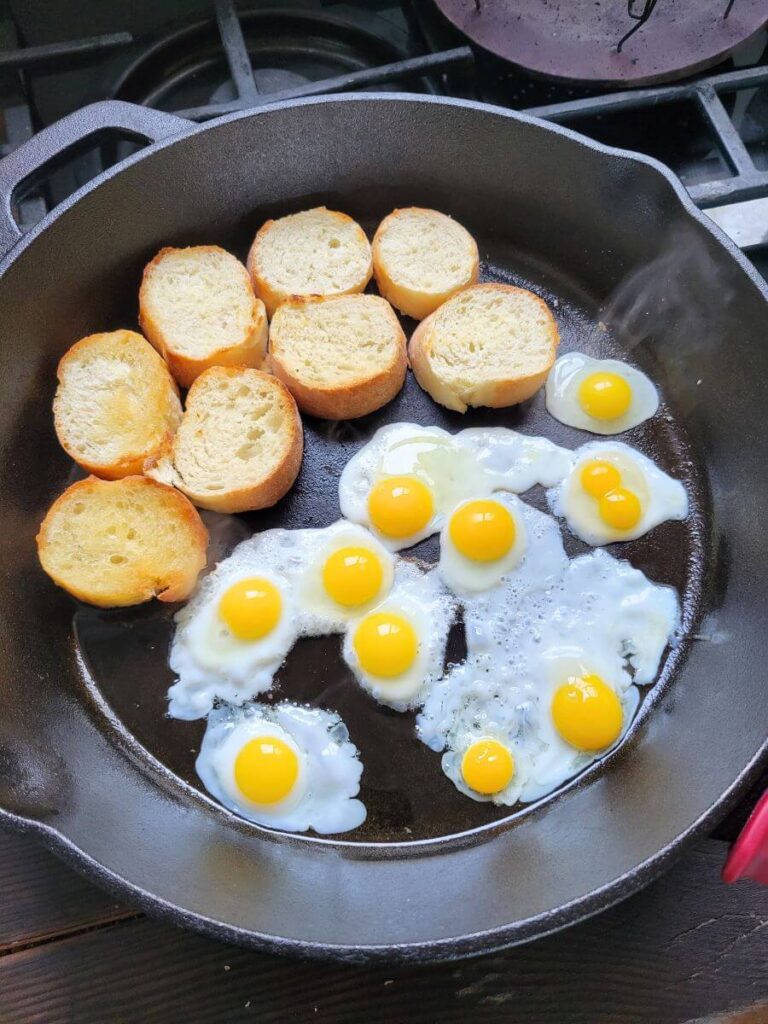
QUAIL EGGS VS. CHICKEN EGGS
If you’re on the fence about whether you should get chickens or quail, you may be wondering how the two compare.
Quail eggs are small, weighing in at an average of about 10 grams per egg. Their shells are typically brown, with a darker brown speckle pattern. Celadon quail will lay blue-hued eggs.
An average chicken egg, on the other hand, will weigh in at about 50 grams. The shell colour of chicken eggs can vary depending on the breed of chicken.
You’ll need about 3-5 quail eggs to equal one chicken egg, depending on the size and breed.
Quail eggs are small but mighty with a higher yolk-to-white ratio and a slightly richer taste than chicken eggs. However, the taste and texture of quail eggs are very similar to those of a chicken egg.
Quail eggs can be used in nearly all the same ways as chicken eggs and can be substituted in almost any recipe. The only case I maybe wouldn’t reach for quail eggs is for meringue or anything that requires a large amount of egg whites. The lower white-to-yolk ratio of quail eggs would mean you’d have to crack a lot of eggs to get the same volume of whites.
Nutritionally, quail and chicken eggs are quite similar, with quail eggs coming in slightly higher for some vitamins and minerals when compared gram for gram. Calcium, iron, and phosphorus in particular are higher in quail eggs.
Here’s a quick comparison of the nutritional content of 100g of quail eggs and chicken eggs:
| Quail | Chicken | |
| Protein | 13g | 12g |
| Fat | 11g | 10g |
| Carbohydrates | .4g | 1g |
| Calories | 158 | 143 |
| Cholesterol | 836mg | 372mg |
| Sodium | 143mg | 129mg |
| Calcium | 64mg | 48mg |
| Iron | 4mg | 2mg |
| Potassium | 132mg | 132mg |
| Magnesium | 13mg | 11mg |
| Phosphorus | 226mg | 18gmg |
You can find a complete analysis of both chicken and quail eggs on the USDA’s FoodData Central website:
As far as egg production, quail may have some advantages over chickens. Quail start laying eggs between 6-10 weeks of age. Chickens don’t start laying until around 18-20 weeks of age. That means you could have eggs 2-3 months sooner with quail, which also means less time housing and feeding them before they start producing.
Quail also require less room than chickens which makes them ideal for those with limited space. They can even be kept in a cage on a patio or in a small back yard.
Both chickens and quail are great birds to raise for eggs. Hopefully, this information will help you choose if you’re unsure of which to get for your situation. Of course, you could always get both!
QUAIL EGG FAQS
When do quail start laying eggs?
Quail hens start laying eggs between 6-10 weeks of age.
Do you need male quail for female quail to lay eggs?
No, you do not need a male quail for the females to lay eggs. Quail hens will still lay eggs without a male around, however, if you are looking to get fertilized eggs for hatching, you will need a male.
How many eggs do quail lay in a day?
At peak production, quail hens will lay about one egg per day. Depending on environment, breed, and health, quail lay between 200-300 eggs per year.
Do quail lay their eggs in nesting boxes?
No, not typically. Quail are ground-dwelling birds and prefer to lay their eggs on the ground. They will lay their eggs anywhere and everywhere so egg collection can be a bit of a daily hunt.
Do quail lay eggs during winter?
Quail need about 14 hours of daylight to lay eggs. You may need to provide additional light if you want them to lay through the winter months. Keep in mind that forcing production and not providing rest periods for the birds will result in shorter lifespans.
How big are quail eggs?
An average quail egg is about 1/3 the size of an average chicken egg. This means you will need 3-4 quail eggs to get the same volume as 1 chicken egg.
How do you store quail eggs?
Unwashed quail eggs with their bloom intact can be stored at room temperature for about 2-4 weeks or about 6 weeks in the refrigerator. If quail eggs are washed and the bloom removed, they must be refrigerated. Fertilized eggs will start to develop at temps over 21C/70F so keep this in mind if you’re storing them on the counter.
How do you crack a quail egg?
The membrane on a quail egg is thicker than those of chicken eggs. Because of this, cracking a quail egg like you do a chicken egg will like result in a mess. Use quail egg scissors or a serrated knife to cut open the large end of the egg for an easier and cleaner process.
How do you cook a quail egg?
Quail eggs can be cooked like any other egg – fried, boiled, poached, scrambled, etc. Quail eggs can be pickled, deviled, used for baking or any other application you can think of. Remember that you’ll need about 3-5 quail eggs to substitute for 1 chicken egg and that the yolk to white ratio of a quail egg is higher than that of a chicken egg.
Do quail eggs taste like chicken eggs?
Largely, yes, quail eggs taste like chicken eggs. Because of the slightly higher yolk to white ratio, quail eggs tend to be a bit richer and more flavourful than chicken eggs.
Are quail eggs good for you?
Yes! Gram for gram, they have more calories, protein, calcium, iron, magnesium, phosphorus, zinc, selenium, and vitamin b-12 than chicken eggs. However, they are lower in carbs, vitamin A, and choline. They are also higher in cholesterol, so keep that in mind if it’s an issue for you.
Why are my quail not laying eggs?
If you are having issues with your quail not laying eggs, some things to look into include:
- Age of the bird
- Diet
- Environment
- Stress levels
- Daylight hours
- Molting season
Looking for more quail resources? Check out my other posts here:
EVERYTHING YOU NEED TO KNOW ABOUT RAISING QUAIL
RAISING COTURNIX QUAIL FOR MEAT
A COMPLETE GUIDE TO INCUBATING AND HATCING QUAIL EGGS



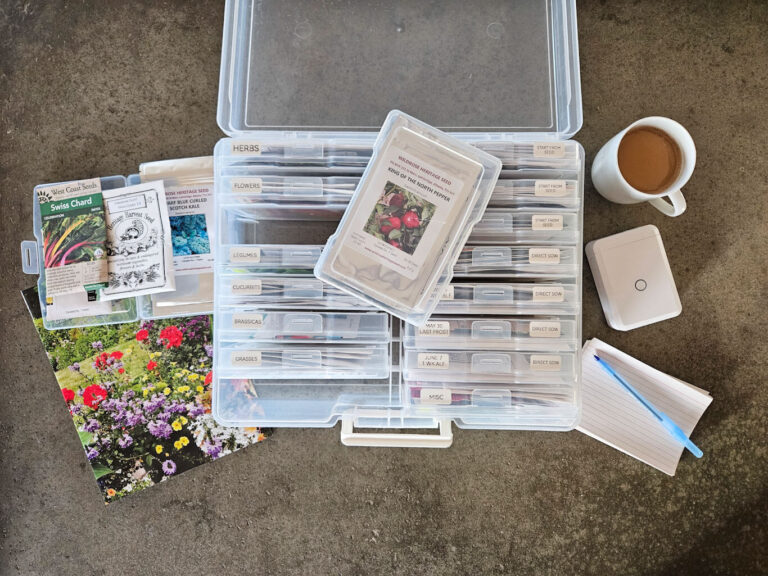


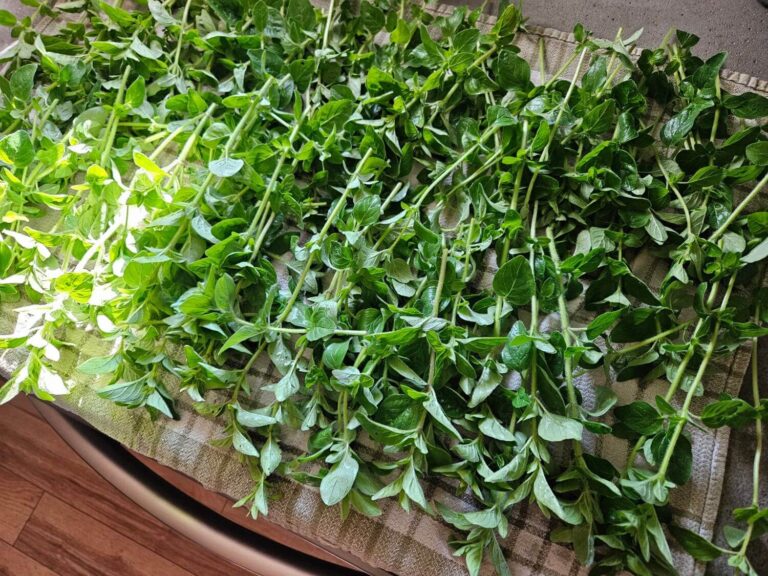
Great overview! Thank you
Thank you for all the great quail articles!